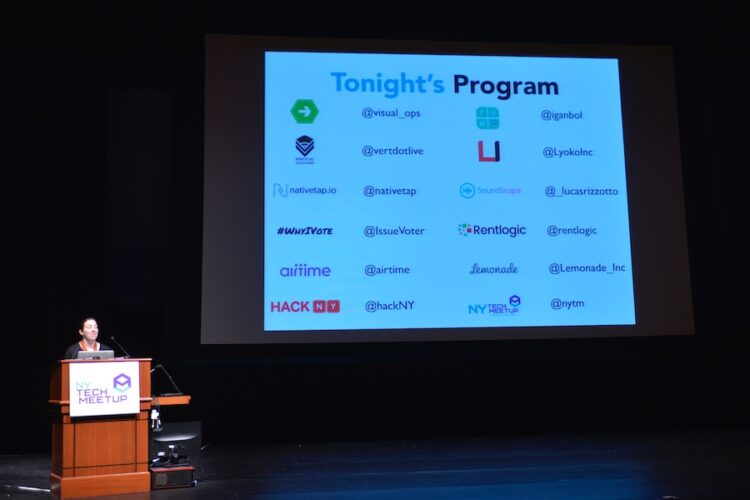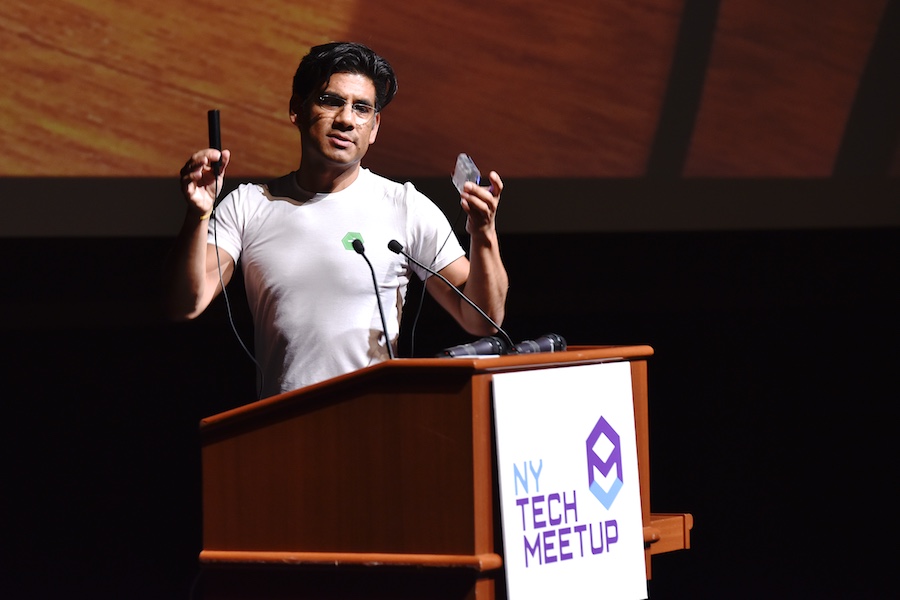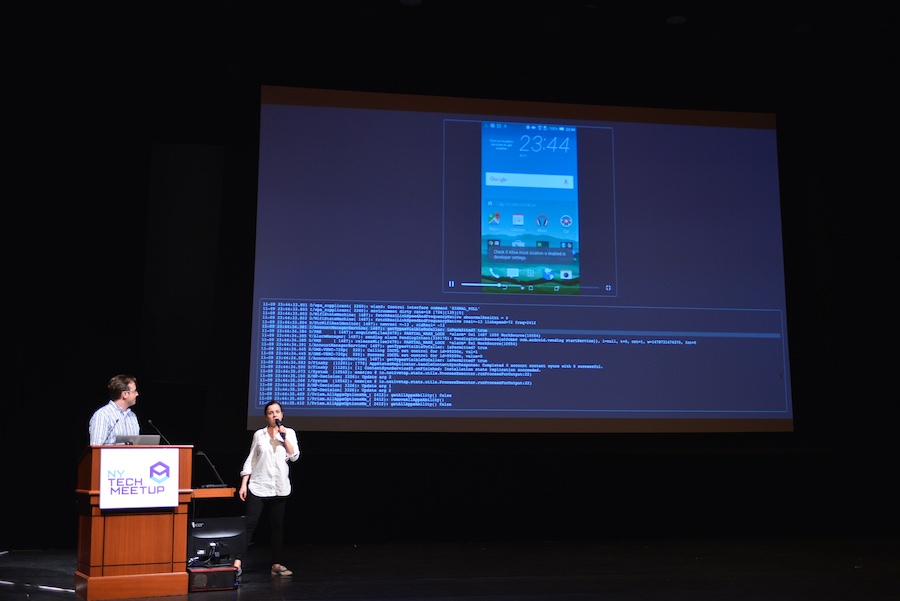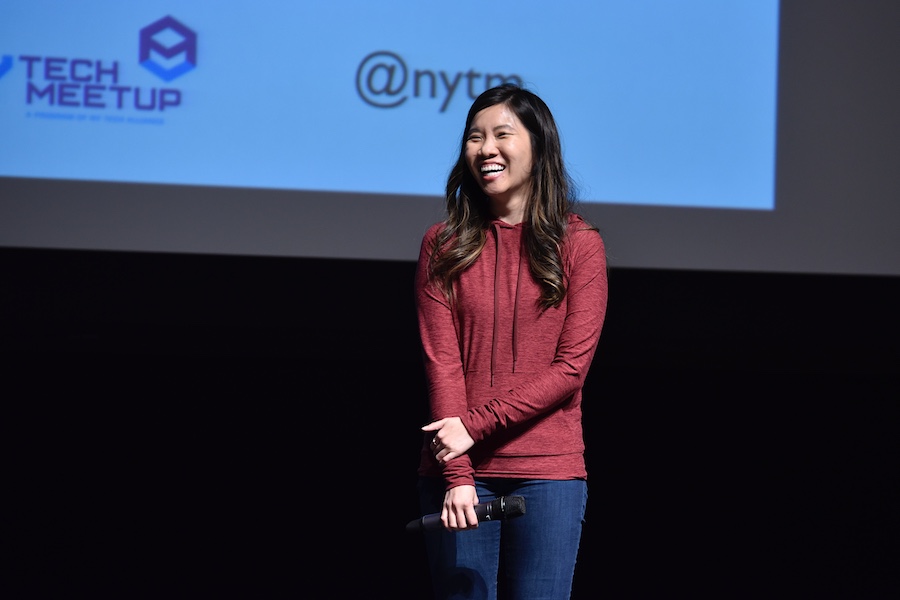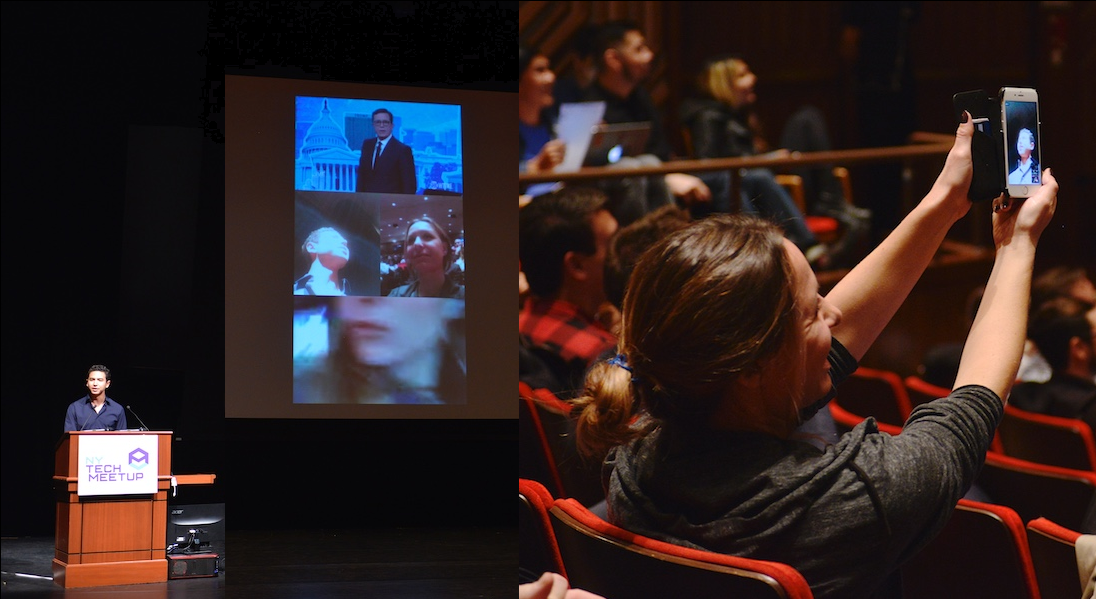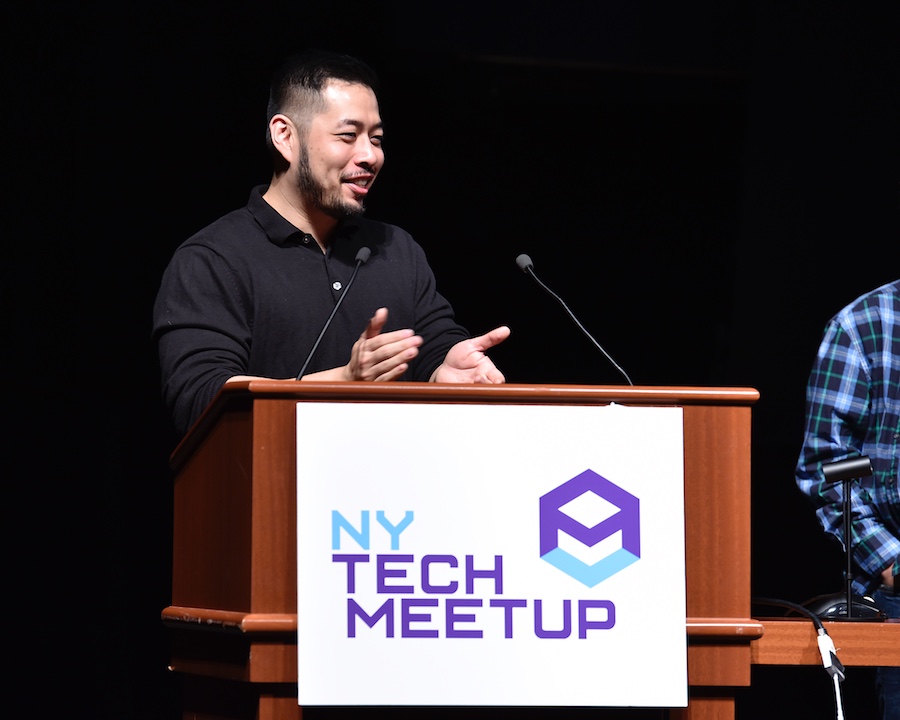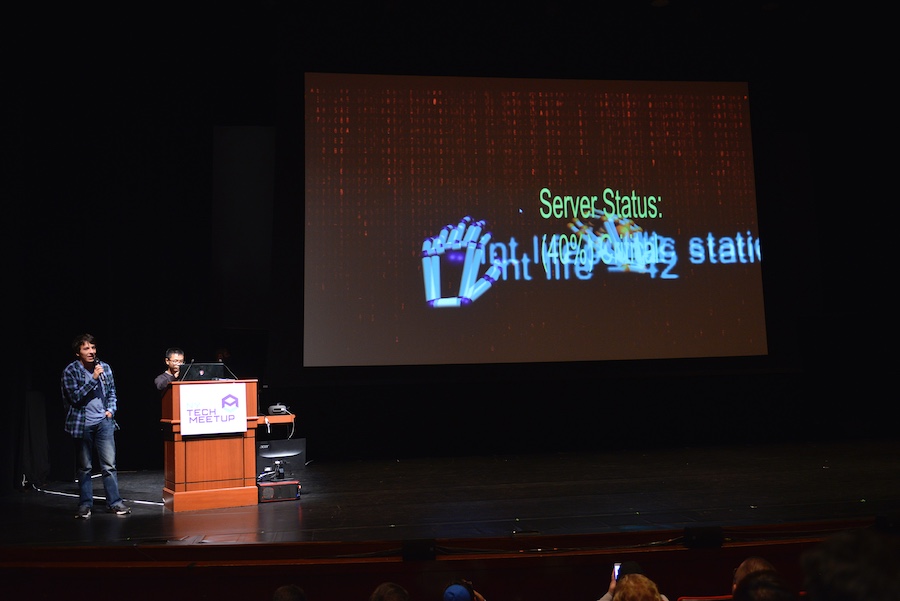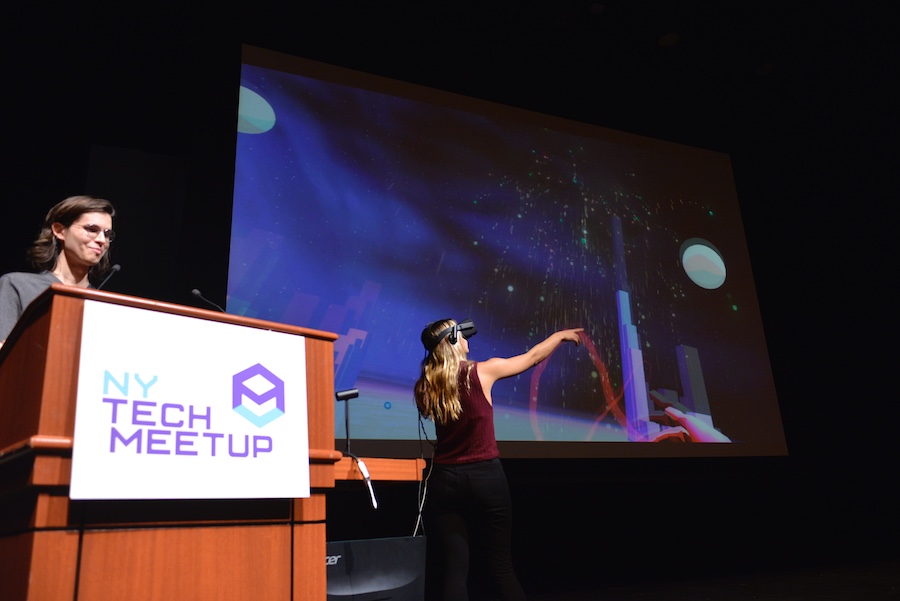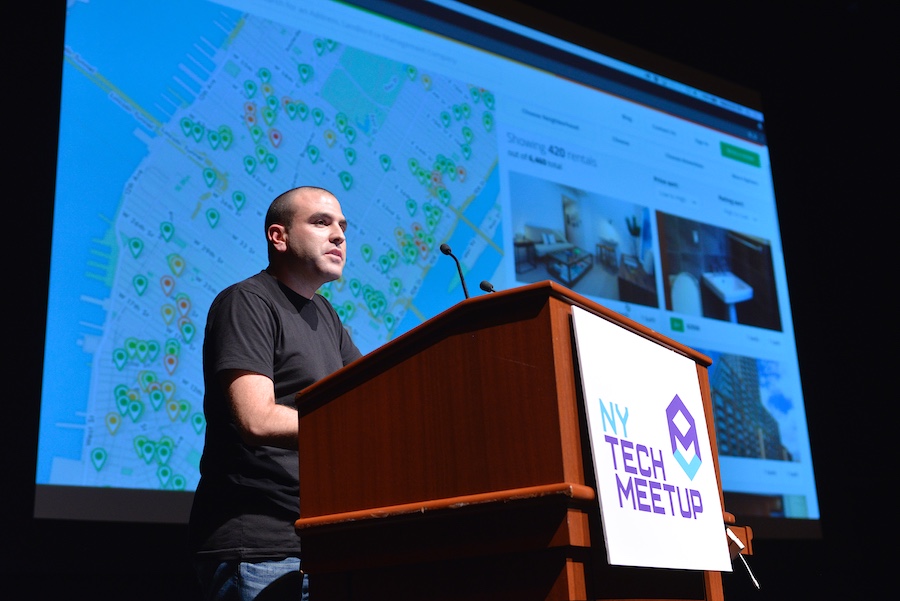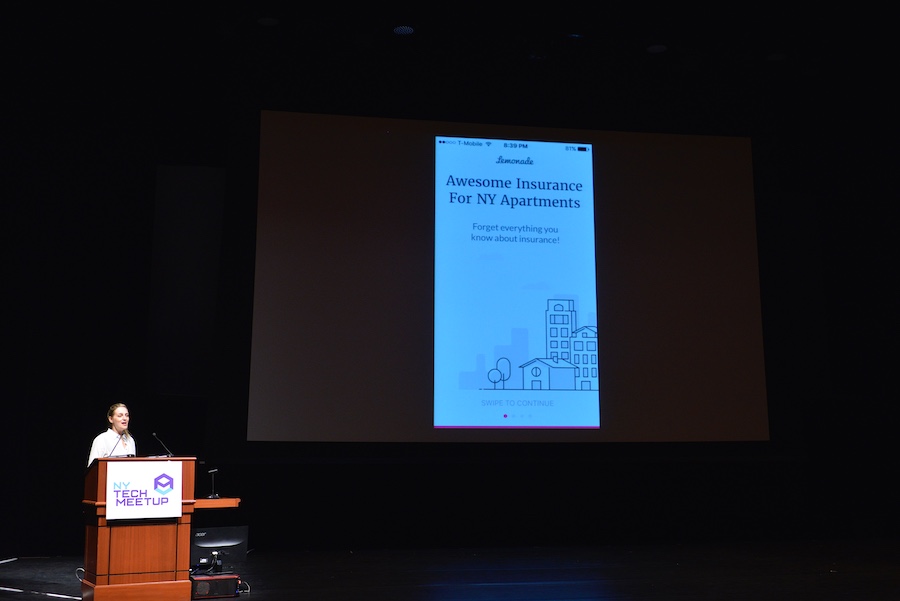The November 2016 NY Tech Meetup
The night after the United States presidential elections, a slightly more subdued New York Tech Meetup came together to re affirm the diversity of people, projects and talents that make up the community. NY Tech Alliance CEO Jessica Lawrence Quinn took time to emphasize these shared values to both the long-time members and first time attendees before diving into an evening of exciting demos.
CLICK HERE TO SEE WHAT WENT DOWN
The first set of projects were from the winners of a recent hackathon at the MD5 National Security Technology Accelerator (NSTXL), a public private partnership between the Department of Defense and NYU. The hackathon was held in New Lab in Brooklyn and focused on tech solutions for humanitarian aid and disaster relief to help first responders. Marvin Alvarez, Marine Corps veteran and leader of the VisualOps team, presented a RaspberryPi based mobile WiFi mesh network device. The product creates a dynamic local network in disaster stricken areas that connects smartphones over Bluetooth and provides a native operational management platform for coordinating streams of tasks across teams in the field.
Also coming out of the MD5 NSTXL hackathon was the team from Vertical Solutions, a project to help firefighters and other first responders track their locations while moving through buildings. The team devised the solution after meeting with mentors at the hackathon from the Department of Defense and Fire Department of New York and discovering the unexpected problem that first responders have with locations tracking. For example, firefighters the FDNY currently track their locations as they move up and down floors with radios and a whiteboard because they cant relay on GPS or WiFi in distressed buildings. Vertical Solutions uses an alternative system with high-powered RFID tags that last up to 10 years placed in the stairwells of each building and scanners attached to first responders that connect to a web app. When first responders pass an RFID tag, their location is updated live on the web app.
The next demo by Nativetap.io catered to the app developers in the crowd, of which there were many. As anyone who’s developed on android platform knows, there’s an overabundance of phone hardware that your app could potentially be run on and all their various quirks must be considered. While emulators can help with testing, they can’t test features requiring hardware like a phone’s camera and nothing really matches native performance. Nativetap solves this problem by allowing developers to install and test their software remotely on real phones in their data center in Poland. The service records screen and command logs from each session for debugging and resets the phone to factory settings when finished.
Though the presidential election might be over, the next startup to present, IssueVoter, wants to keep people engaged. IssueVoter was started by Maria Yuan while she was still working full-time in a strategy role at Credit Suisse, but she recently left that job to apply herself full-time to company. The platform is aimed at keeping people connected to their representatives between election cycles by curating information on legislation and enabling users to connect with their representative and share their position on social media. Many felt that the platform is needed now more than ever to assure the individuals can have an effect on upcoming legislation that may be of greater concern to some under the new administration.
After a series of serious demonstrations, Airtime lightened the mood with its fun app for group video chats. The app allows user to organize their experience by grouping people and conversation topics into different rooms. Each room is an interactive environment where members not only chat on screen, but over group messaging and can drop in other elements like Spotify playlist, YouTube videos or Twitch streams for collaborative consumption. The rooms can be crazy, fun or constructive as demonstrated live when Airtime team members in the audience join a discussion about Stephen Colbert’s election special playing in their chat room.
Up next were the top 3 winning teams from the Fall 2016 hackNY Student Hackathon. The hackNY program, co-organized by faculty from NYU and Columbia since 2010, organizes student hackathons during the school year in order to create and empower a community of student-technologists. Kicking off the demos was the first-place team from FunSquare, an augmented reality app that overlays the mobile camera’s field of vison with location pins of restaurants, café’s and other area venues. The app allows users to not only explore local offerings, but also to read and leave reviews as part of a social discovery experience.
Next, the LyokoInc team from Rutgers University showed off Defending Hackerspace, the VR game they cobbled together over the course of the hackathon. The user plays as a Tron-style pair of disembodied hands inside a virtual server that it must defend by swatting away incoming attacks from devious hackers. The team used C# to make the scripts and model objects run in the Unity game engine and displayed the experienced through Oculus Rift.
Rounding out the winning teams from hackNY was SoundScape VR, a project bringing together music and procedurally generated environments in VR for unique immersive experiences. Like a music visualizer on steroids, SoundScape uses the Unity3D Game Engine and Leap Motion to create an environment that uniquely respond to both user actions and the sound itself. After the world is built, various elements in the world come alive and react to the song’s beat, tempo, frequency, volume and other aspects of the music as it plays. The user can move their hands around freely, interact with randomly generated objects, and even create trailing light.
Anyone who has tried to rent in New York City can explain why the next product struck a deep chord with the audience. TED Fellow Yale Fox presented his startup RentLogic, an apartment rental search engine that rates landlords, buildings and property management to help tenants and apartment seeker make informed decisions about where to live. The platform pulls in public data from the NYC Housing Authority to compile individual grades for both building and landlords based on historic complaints and reports of building infestation, damage, electric, heating, plumbing and a slew of other issues. The platform was met with applause and audience praise as Yale described how user can search and compare apartments by location price and grade for a more transparent shopping experience.
The evening rounded out with a demo from NYC insurance startup Lemonade. After finding your dream apartment, perhaps with a tool like with RentLogic, Lemonade lets you purchase home or renters insurance right from their mobile app. The app verifies your identity with personal information provided and walks you through a series of questions about your neighborhood, building and possessions through its AI chatbot interface. Users can then purchase a policy and begin making claims right from the app. Unlike other insurers, Lemonade takes a flat fee and gives any unclaimed balance to an approved charity of the user’s choice at the end of the year.


